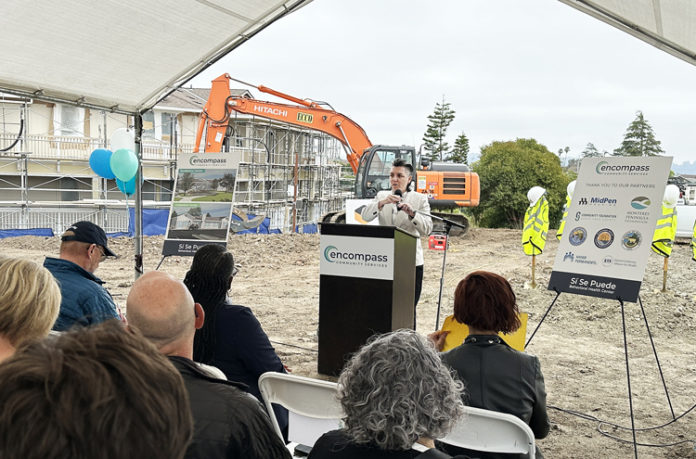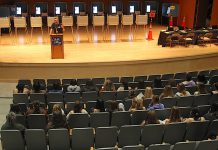
An organization that helps men break free from drug and alcohol addiction officially broke ground on June 21 on a new Behavioral Health Center on Miles Lane in Watsonville.
Sí Se Puede, which is run by Encompass Community Services, is expected to reopen in fall 2025.
“Today we are recognizing an incredible milestone; today is a dream that’s becoming a reality,” Encompass Community Services CEO Monica Martinez told the crowd of roughly 200 people who gathered for the event. “This is a dream that began over 30 years ago with a group of Latinx men who recognized that there was no place for themselves, their community to seek treatment, healing, hope and support. So together, they founded the Sí Se Puede program, the first of its kind — monolingual Spanish — treatment program for men in the state of California, and probably for the nation at the time.”
Martinez said the former building—which was built in the 1940s—was deteriorating, and almost all furniture was coming apart and that the “space couldn’t keep up with the purpose any longer.”
Sí Se Puede is partnering with MidPen Housing, Inc., which is building 72 units of affordable housing on the adjacent property.
The new center will include a 7,766-square-foot, 30-bed residential treatment building, group and one-on-one therapy rooms, a medical clinic, an industrial kitchen, dining and recreational areas, client intake room, a client computer use space, exercise areas, and an outdoor courtyard with a “meditation garden.”
Jorge Gutierrez, program manager and one of Si Se Puede’s founders, spoke of the grants and donations over the years of goods such as a TV, a sofa, food, a chair.
“That’s how we survived all these years — so many people in our community have helped us,” he said.
Sí Se Puede serves Spanish speaking men for 30-90 day periods, based on individual client needs.
The new facility is expected to support more than 1,300 community members annually.
Andres Galvan, a mental health client specialist with Santa Cruz County, said he was a 2007 graduate of Sí Se Puede, having entered the program with drug issues.
“They allowed me to change the structure of my life and hold myself accountable for my actions,” he said. “I came out with a new view of life and now I work in mental health and can help people, the same way Si Se Puede helped me regain my life.”
Senator John Laird told the crowd that 45 years ago, when he worked in health and social services for the county, there was one bilingual social worker for the entire Pajaro Valley.
“The Pajaro Valley is coming of age, whether it’s the water project, saving the hospital or the culinary program in the school district, the Wellness Center … to this program: The community is bubbling up in a way that services are truly being delivered and they are really matching who is here,” Laird said.










